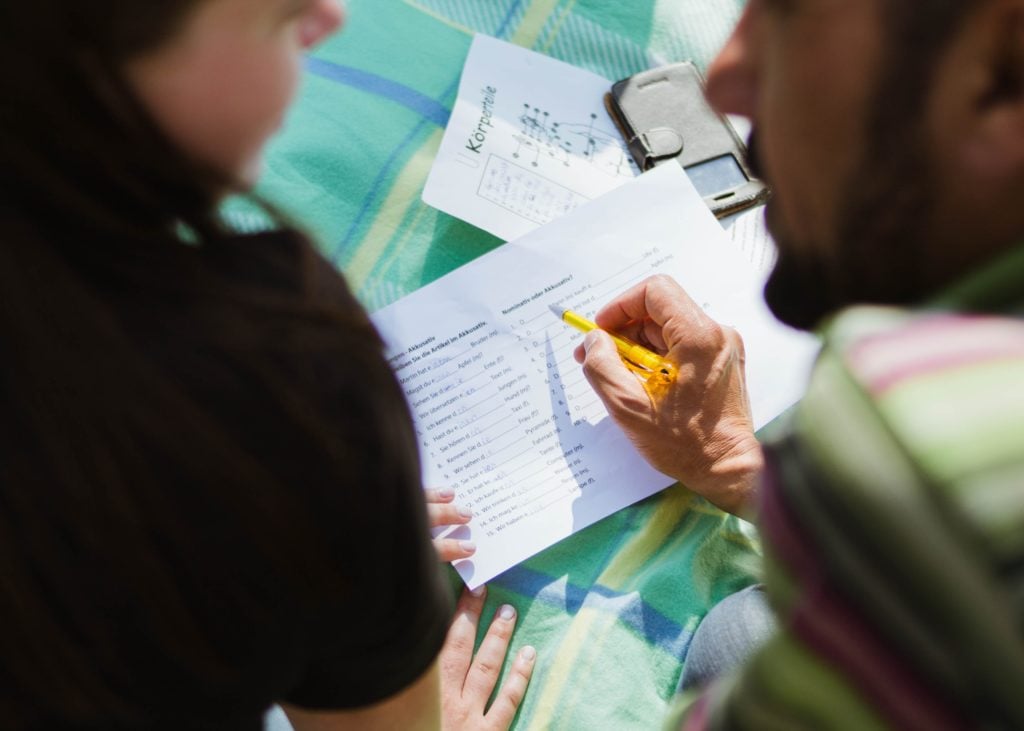The seven stages of learning German every foreigner goes through

German is a notoriously difficult language to learn and the path to fluency is marked by milestones that every budding German speaker will recognise.
Stage 1: Terror
You’ve just set foot on Austrian soil and are ready to begin your new life in Österreich. While you may have left home feeling excited and full of enthusiasm for learning the German language, you now find yourself in a world of alarmingly long and confusing words containing strange symbols which are impossible to pronounce - and that's before realising that there are regional dialects to make things harder.
You’re confronted with long words like Ausländerbehörde, Aufenthaltsbescheinigung, and Wohnungsanmeldung and the prospect of having to get to grips with a language whose average word contains 14 letters slowly dawns on you. It’s terrifying.
Tip: Don’t panic. At first, learning German can seem like a daunting prospect, but as you start to take your first baby steps into the language, you’ll soon realise it’s not as bad as you think. And those long words are just lots of smaller words squashed together.
READ ALSO: ‘Brutal’: What it’s really like to learn German in Austria
Stage 2: Determination
You’ve got over the initial shock of realising the true scale of the linguistic mountain you'll have to climb to learn German - and you resolve to conquer it.
You enrol in a language course and arm yourself with grammar books and language learning apps, and you start making progress very quickly. You realise that a lot of German words have the same roots as their English cousins and that words and phrases are sticking in your head more quickly than you expected. The flames of optimism begin to grow.

A couple practices the German language. Photo: Annika Gordon/Unsplash
Tip: Keep up that spirit and persist with the grammar books and vocab learning, ideally on a daily basis and start speaking the language as much as you can - even if it's just reading aloud to yourself.
Stage 3: Obsession
Spurred on by your new ability to introduce yourself, talk about the weather and tell people about your pets, you launch an all-out assault on the German language.
READ ALSO: How to remember the gender of German words
You’ve got post-it notes filled with vocab stuck all over your flat, you’ve got three tandem partners and ORF is blasting 24/7 from your Laptop.
You are now officially obsessed with the German language.
Tip: Don't be too hard on yourself once this phase of unbridled enthusiasm burns out. Though it's great to have a period of immersion in the long-run, regular learning - even for shorter periods - is the key to progress.
Stage 4: Experimentation
You’ve now got a solid base of internal vocab and you’ve got to grips with the most important grammar rules. You can use the dative and genitive cases with increasing ease and you're using modal verbs on a regular basis.
You now feel ready to road-test your new language skills in the big wide world. You don't ask Sprechen Sie englisch? (do you speak English?) any more and instead try to communicate only in German.
Tip: Bolster this experimentation phase by consuming more Austrian media. Listen to Austrian podcasts, check out Austrian TV shows and try to read the news in German.
READ ALSO: 8 Austrian TV series to watch to improve your (Austrian) German
Stage 5: Frustration
Just as you were starting to gain confidence in the language, you hit a brick wall. You spent an evening in the company of German speakers, or you attended a meeting at work where you found yourself fumbling for vocabulary and stumbling over grammar.
You can't, for the life of you, remember whether it's der, die or das Licht even though you've looked it up at least a hundred times.

A German dictionary. Photo: Joshua Hoehne/Unsplash
What’s the point, you ask yourself. You want to give up and just switch to speaking English permanently, as everyone you meet seems to speak perfect English anyway.
Tip: Everyone feels like this at some point when learning a new language and it’s likely to happen more than once on your language-learning journey. Keep going and don't compare your German language skills with the English skills of German natives. Remember that most Austrians have grown up listening to songs and watching films in English, so it will take you a bit longer to get to grips with German in the same way.
Stage 6: Breakthrough
You're not quite sure what's happened, but something seems to have clicked. You’re suddenly using the right past participles 90 percent of the time and you’re using reflexive verbs with ease. People are rarely switching to English when speaking to you and you're understanding almost everything you see and hear.
READ ALSO: Six ways to fall in love with learning German again
Tip: Remember this feeling when you are revisited by frustration in the future.
Stage 7: Acceptance
You still make mistakes, you don’t know all of the words in the German dictionary, and you still mix up der, die and das - but it's ok. You've come a long way and you accept that your German will probably never be perfect and that the learning process will be a lifelong pursuit.
Tip: The more you use the language, the more you'll improve. Keep reading, speaking and listening and, one day, it won't even feel like an effort anymore.
Comments
See Also
Stage 1: Terror
You’ve just set foot on Austrian soil and are ready to begin your new life in Österreich. While you may have left home feeling excited and full of enthusiasm for learning the German language, you now find yourself in a world of alarmingly long and confusing words containing strange symbols which are impossible to pronounce - and that's before realising that there are regional dialects to make things harder.
You’re confronted with long words like Ausländerbehörde, Aufenthaltsbescheinigung, and Wohnungsanmeldung and the prospect of having to get to grips with a language whose average word contains 14 letters slowly dawns on you. It’s terrifying.
Tip: Don’t panic. At first, learning German can seem like a daunting prospect, but as you start to take your first baby steps into the language, you’ll soon realise it’s not as bad as you think. And those long words are just lots of smaller words squashed together.
READ ALSO: ‘Brutal’: What it’s really like to learn German in Austria
Stage 2: Determination
You’ve got over the initial shock of realising the true scale of the linguistic mountain you'll have to climb to learn German - and you resolve to conquer it.
You enrol in a language course and arm yourself with grammar books and language learning apps, and you start making progress very quickly. You realise that a lot of German words have the same roots as their English cousins and that words and phrases are sticking in your head more quickly than you expected. The flames of optimism begin to grow.

Tip: Keep up that spirit and persist with the grammar books and vocab learning, ideally on a daily basis and start speaking the language as much as you can - even if it's just reading aloud to yourself.
Stage 3: Obsession
Spurred on by your new ability to introduce yourself, talk about the weather and tell people about your pets, you launch an all-out assault on the German language.
READ ALSO: How to remember the gender of German words
You’ve got post-it notes filled with vocab stuck all over your flat, you’ve got three tandem partners and ORF is blasting 24/7 from your Laptop.
You are now officially obsessed with the German language.
Tip: Don't be too hard on yourself once this phase of unbridled enthusiasm burns out. Though it's great to have a period of immersion in the long-run, regular learning - even for shorter periods - is the key to progress.
Stage 4: Experimentation
You’ve now got a solid base of internal vocab and you’ve got to grips with the most important grammar rules. You can use the dative and genitive cases with increasing ease and you're using modal verbs on a regular basis.
You now feel ready to road-test your new language skills in the big wide world. You don't ask Sprechen Sie englisch? (do you speak English?) any more and instead try to communicate only in German.
Tip: Bolster this experimentation phase by consuming more Austrian media. Listen to Austrian podcasts, check out Austrian TV shows and try to read the news in German.
READ ALSO: 8 Austrian TV series to watch to improve your (Austrian) German
Stage 5: Frustration
Just as you were starting to gain confidence in the language, you hit a brick wall. You spent an evening in the company of German speakers, or you attended a meeting at work where you found yourself fumbling for vocabulary and stumbling over grammar.
You can't, for the life of you, remember whether it's der, die or das Licht even though you've looked it up at least a hundred times.

What’s the point, you ask yourself. You want to give up and just switch to speaking English permanently, as everyone you meet seems to speak perfect English anyway.
Tip: Everyone feels like this at some point when learning a new language and it’s likely to happen more than once on your language-learning journey. Keep going and don't compare your German language skills with the English skills of German natives. Remember that most Austrians have grown up listening to songs and watching films in English, so it will take you a bit longer to get to grips with German in the same way.
Stage 6: Breakthrough
You're not quite sure what's happened, but something seems to have clicked. You’re suddenly using the right past participles 90 percent of the time and you’re using reflexive verbs with ease. People are rarely switching to English when speaking to you and you're understanding almost everything you see and hear.
READ ALSO: Six ways to fall in love with learning German again
Tip: Remember this feeling when you are revisited by frustration in the future.
Stage 7: Acceptance
You still make mistakes, you don’t know all of the words in the German dictionary, and you still mix up der, die and das - but it's ok. You've come a long way and you accept that your German will probably never be perfect and that the learning process will be a lifelong pursuit.
Tip: The more you use the language, the more you'll improve. Keep reading, speaking and listening and, one day, it won't even feel like an effort anymore.
Join the conversation in our comments section below. Share your own views and experience and if you have a question or suggestion for our journalists then email us at [email protected].
Please keep comments civil, constructive and on topic – and make sure to read our terms of use before getting involved.
Please log in here to leave a comment.